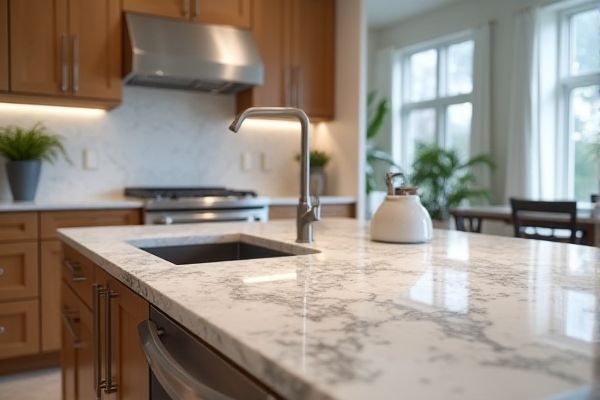
Quartz countertops offer non-porous durability and low maintenance, resisting stains and scratches better than granite, which provides natural stone beauty with unique patterns and heat resistance. Discover which countertop material best suits Your kitchen needs by reading the full article.
Table of Comparison
| Feature | Quartz Countertop | Granite Countertop |
|---|---|---|
| Material Composition | Engineered stone made from 90% natural quartz and resins | Natural volcanic igneous rock, mined and cut |
| Durability | Highly durable, resistant to scratches and stains | Very durable but may be prone to chipping |
| Maintenance | Low maintenance; non-porous, no sealing required | Requires periodic sealing; porous surface |
| Appearance | Consistent patterns with a wide range of colors | Unique, natural veining and color variations |
| Heat Resistance | Moderate; avoid direct contact with hot pans | High; withstands heat better but still avoid thermal shock |
| Cost | Generally higher price due to manufacturing process | Varies; natural stone can be more affordable or costly depending on rarity |
| Installation | Requires professional installation due to weight and resin bonding | Professional installation recommended due to hardness and weight |
| Environmental Impact | Uses resins and engineered materials; moderately eco-friendly | 100% natural stone; quarrying has environmental effects |
Introduction to Quartz and Granite Countertops
Quartz countertops are engineered surfaces composed of approximately 90% ground natural quartz mixed with resin and pigments, offering enhanced durability and uniform appearance. Granite countertops are natural stone slabs formed from cooled magma, prized for their unique, variegated patterns and heat resistance. Your choice between quartz and granite depends on preferences for maintenance, appearance, and durability in kitchen or bathroom applications.
Material Composition and Appearance
Quartz countertops consist of approximately 90% engineered quartz combined with resin and pigments, offering a non-porous, uniform surface with a wide range of colors and patterns resembling natural stone. Granite countertops are composed of 100% natural igneous rock, featuring unique, irregular veining and color variations due to mineral content, resulting in a one-of-a-kind appearance for each slab. The engineered nature of quartz provides consistent patterns and enhanced durability, while granite's natural formation ensures distinctive, intricate designs.
Durability and Strength Comparison
Quartz countertops offer exceptional durability due to their engineered composition, making them highly resistant to scratches, stains, and impacts, which often surpasses the natural hardness of granite. Granite countertops, while naturally strong and heat-resistant, require periodic sealing to maintain their protective surface against potential damage and staining. Your choice hinges on prioritizing maintenance ease or natural stone aesthetics while ensuring long-lasting strength in your kitchen or bathroom surfaces.
Maintenance and Cleaning Requirements
Quartz countertops offer low maintenance due to their non-porous surface, making them resistant to stains and easy to clean with mild soap and water. Granite countertops require periodic sealing to prevent staining and maintain their durability, and cleaning should be done with a pH-balanced cleaner to avoid damage. Your choice may depend on how much effort you want to invest in upkeep, with quartz providing a more hassle-free experience.
Stain and Scratch Resistance
Quartz countertops offer superior stain and scratch resistance due to their engineered composition, which combines natural quartz with resins and pigments for enhanced durability. Granite countertops, while naturally hard and resistant to scratches, may be more porous and vulnerable to staining if not properly sealed and maintained. Your choice between quartz and granite should consider the level of daily wear and exposure to potential stains to ensure long-lasting beauty and functionality.
Cost and Value Analysis
Quartz countertops generally cost between $50 and $150 per square foot, offering consistent patterns and low maintenance, which can enhance your home's long-term value. Granite countertops range from $40 to $100 per square foot, with natural variations that appeal to luxury buyers but may require regular sealing and upkeep. Both materials provide strong resale value, but quartz's durability and uniform appearance often deliver better cost-effectiveness over time.
Environmental Impact and Sustainability
Quartz countertops generally have a lower environmental impact than granite due to their manufacturing process, which uses engineered materials allowing for less natural resource extraction. Granite countertops are quarried from natural stone, leading to significant landscape disruption and higher transportation emissions because granite slabs are heavy and often shipped internationally. Your choice of countertop affects sustainability, as quartz offers more eco-friendly options, especially if sourced from manufacturers using recycled materials and responsible production practices.
Installation Process and Considerations
Quartz countertop installation involves precise fabrication in a controlled environment, ensuring consistent quality and minimal on-site adjustments, while granite requires careful cutting and fitting directly at your location due to its natural variations. Your choice may depend on the weight and edging, as granite is heavier and more brittle, demanding specialized tools and professional expertise for seamless installation. Considering these factors can help you prepare for potential challenges and costs associated with each material's installation process.
Design Versatility and Customization Options
Quartz countertops offer exceptional design versatility with a wide range of colors, patterns, and finishes that can mimic natural stone or provide unique, consistent looks. Granite countertops provide natural beauty with unique, one-of-a-kind patterns, but customization is limited to available stone slabs and finishes. Choosing quartz allows you to tailor your countertop to specific aesthetic preferences, enhancing your kitchen's overall design.
Pros and Cons: Quartz vs. Granite Countertops
Quartz countertops offer non-porous surfaces that resist stains, scratches, and require minimal maintenance, making them ideal for busy kitchens. Granite countertops provide unique, natural patterns with heat resistance but need periodic sealing to prevent staining and bacterial growth. Quartz may lack the natural variability of granite, while granite offers more organic aesthetics but demands higher upkeep.
 homyna.com
homyna.com